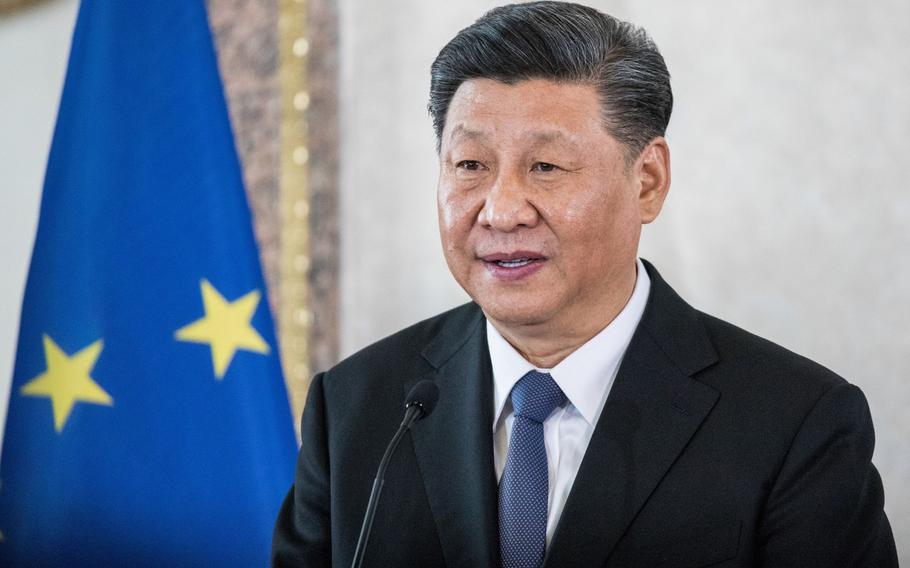
Xi Jinping in Rome on March 22, 2019. (Alessia Pierdomenico/Bloomberg)
Chinese President Xi Jinping told European Union leaders that he wants the two sides to be key trade partners capable of building trust over supply chains, as they met in Beijing to hash out a litany of economic concerns and frustrations.
“China is promoting high-quality development and high-level opening up, and is willing to regard the E.U. as a key partner in economic and trade cooperation,” Xi said in a meeting Thursday in Beijing with European Commission President Ursula von der Leyen and European Council President Charles Michel. He said China wants to consider Europe a “trusted partner in industrial and supply chain cooperation to pursue mutual benefit and win-win results,” state broadcaster China Central Television reported.
The talks marked the first in-person summit between China and the EU officials in four years, and was expected to cover long-standing issues ranging from data flows to market access. Tensions between Brussels and Beijing have flared over efforts by Europe to “de-risk” its supply chains, along with the bloc’s recent anti-subsidies investigation into electric vehicles made in China.
Von der Leyen said the two sides had “intense” conversations on key issues related to the worsening trade imbalance, including the medical device and cosmetics sectors.
“We agreed that we have now a list of different elements where we want to deep dive in together in the high-level dialog,” she said during a news conference in Beijing. “This is important. First of all, on our side to show the evidence. But secondly, then also to see concrete results on the ground.”
China criticized that probe on Thursday at a separate briefing in Beijing, where Ministry of Commerce spokesperson He Yadong urged the EU to stop using that investigation for “trade protectionism.”
During the meeting, Xi called on Beijing and the bloc to “eliminate all kinds of interference,” according to CCTV. That remark is likely aimed at the U.S., which has taken actions including enlisting the Netherlands in its effort to stop China from developing the ability to make high-end semiconductors.
Von der Leyen described her conversation with Xi as “good and candid” in a post on X, the platform formerly known as Twitter. They discussed the “main challenges in a world with increasing geopolitical frictions,” she said, adding that they pledged to increase people-to-people exchanges and agreed to a shared interest in “balanced trade relations.”
Ahead of Thursday’s meeting in Beijing, Italy formally told China it would exit the nation’s Belt and Road Initiative. While Italy had for months been preparing to end its involvement in Xi’s signature investment program, the timing of the announcement underscored continued strains between the world’s second-largest economy and members of the bloc.
Xi and the EU leaders discussed Belt and Road during their meeting, according to CCTV, which said the Chinese leader told officials that his nation was willing to connect his initiative with the EU’s Global Gateway. The European program is a €300 billion infrastructure plan aimed at competing with China’s clout in strategic regions.
Headed into Thursday’s summit, EU officials intended to ask for more effort cracking down on Moscow’s ability to circumvent sanctions, according to people familiar with its plans. China has emerged as Russia’s primary route to secure banned technologies and so-called battleground goods. But the bloc is realistic about the outcomes, with no specific deliverable expected, the people said.
“Deep issues” stand in the way of good relations between Beijing and Brussels, Jens Eskelund, president of the European Union Chamber of Commerce in China, told Bloomberg TV. He cited Russia’s war in Ukraine, the trade deficit and Chinese overcapacity that gets exported to Europe.
“That will need to be addressed before things go wrong between the two sides,” he said, adding that a partnership with China needs to create “equal or close to equal value” for both parties.
The EU is concerned that Beijing’s flagging economic recovery including weak domestic demand will result in China pushing to export even more, threatening critical industries in Europe and their workers. The EU’s trade deficit with China grew to more than $400 billion last year and the bloc is eager to continue its strategic approach that views Beijing as a partner, competitor and a rival.
With assistance from Lucille Liu, James Mayger, Tom Hancock and John Follain.
More stories like this are available on bloomberg.com
©2023 Bloomberg L.P.